Heritage Bakery & Cafe
Address: 73-2 Hankou St Sec 1, Taipei City (台北市漢口街一段73號之2)
Telephone: (02) 2311-1079
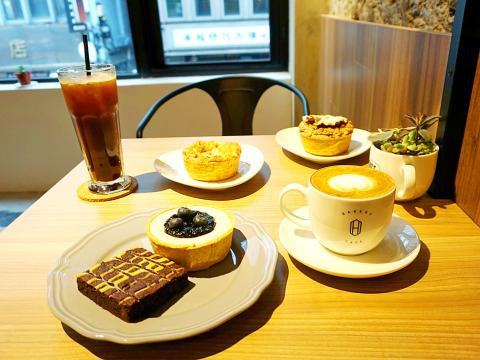
Photo: Dana Ter, Taipei Times
Open: Tuesdays to Sundays from 11am to 6pm
Average meal: NT$180 to NT$400
Details: Menu in English and Chinese
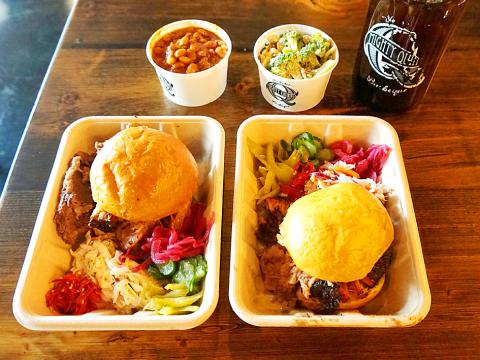
Photo: Dana Ter, Taipei Times
On the net: www.facebook.com/heritagetaipei
Located along western Taipei’s historic “camera street,” the five-story building that now houses Heritage Bakery & Cafe once belonged to owner Sally Song’s (宋友齡) grandfather. For decades, the lower two floors were rented out as a camera shop while Song’s family occupied the upper three levels.
The interior is designed by Song herself — a San Francisco native who recently moved to Taipei. There’s nothing cutesy or over-the-top about this bakery which boasts a rustic and spacious NorCal feel. The original red brick walls are left intact and interspersed throughout the cafe are some of the family’s antiques including cabinets, suitcases and old fans.
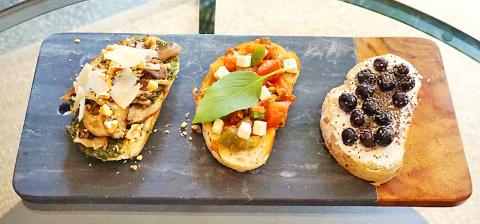
Photo: Dana Ter, Taipei Times
Patrons order downstairs from a wide range of North American-style pastries such as bacon and mushroom potato pie (NT$180) and blueberry cheese tart (NT$180). Song also likes to use local ingredients, especially fruits, in desserts such as the guava cake (NT$150) and pineapple pie (NT$180). Try the mulled cider (NT$140), which has been a big hit this season.
Mighty Quinn’s Barbeque
Address: 109 Renai Rd Sec 4, Taipei City (台北市仁愛路四段109號)
Telephone: (02) 2772-6174
Open: Daily from 11:30am to 11pm
Average meal: NT$300 to NT$1,000
Details: Menu in English and Chinese, credit cards accepted
On the net: www.facebook.com/mightyquinnsbbq.tw
What started as a weekend stall serving good old-fashioned American Southern-style barbecue at Smorgasburg — the outdoor food market by the Williamsburg waterfront in Brooklyn, New York — soon grew into a thriving business in Manhattan’s East Village, with outposts around the world following suit.
The brisket (NT$360) and pulled pork (NT$320) at the Taipei outpost of Mighty Quinn’s Barbeque does not disappoint, though be warned: this place is not for the faint-hearted. Those with voracious appetites might want to try the brontosaurus rib (NT$1,200).
Choose your meat, sides and drinks — including locally brewed craft beer (NT$200 to NT$280) and a refreshing homemade ice tea (NT$60) — at the counter. All meats come with a bun, coleslaw and pickled vegetables. The meat is cooked Texan-style, charred and almost falling off the bone, which creates a distinct smoky flavor. Each table has a gigantic bottle of barbecue sauce — be sure to add copious amounts to your food.
Yucca Cafe
Address: 16, Aly 4, Ln 251, Zhongxiao E Rd Sec 3, Taipei City ( 台北市忠孝東路三段251巷4弄16號)
Telephone: (02) 2773-3678
Open: Sundays to Thursdays from 10am to 9pm, Fridays and Saturdays from 10am to 10pm
Average meal: NT$400 to NT$1,000
Details: Menu in English and Chinese, cash only, minimum charge is NT$120 per person
On the net: www.facebook.com/yuccataipei
Enjoy the flavors of the Brazilian Amazon at Yucca Cafe, Taipei’s newest health-conscious cafe. Co-owners Fabio Grangeon and Tordan Ferreira met while studying at Ming Chuan University before launching Purple Passion, a freeze-dried powder imported from Brazil. This is used to make their signature drink, the Acai Jar (NT$310), which is topped with acai imported from the Amazon Rainforest.
Though acai is old news in North America, the craze has yet to hit Taiwan, and the menu at Yucca contains a lengthy description of the super fruit, from cultivation methods to the vitamins and antioxidants it contains.
Popular ingredients include chia seeds, homemade pesto, basil, nuts and tons of fruits. The Yucca Toast (NT$380) — a selection of three sweet and savory toasts — is highly recommended. In keeping with their holistic menu, ambiance is meditative, with plants in burlap sacks and ceiling lights and mirror frames carved from driftwood found on the beaches of Yilan by Grangeon himself.
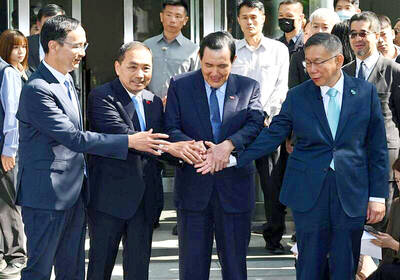
Has the Taiwan People’s Party (TPP) changed under the leadership of Huang Kuo-chang (黃國昌)? In tone and messaging, it obviously has, but this is largely driven by events over the past year. How much is surface noise, and how much is substance? How differently party founder Ko Wen-je (柯文哲) would have handled these events is impossible to determine because the biggest event was Ko’s own arrest on multiple corruption charges and being jailed incommunicado. To understand the similarities and differences that may be evolving in the Huang era, we must first understand Ko’s TPP. ELECTORAL STRATEGY The party’s strategy under Ko was
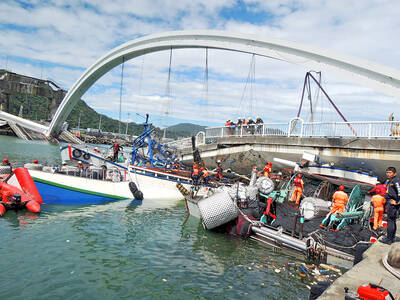
Before the recall election drowned out other news, CNN last month became the latest in a long line of media organs to report on abuses of migrant workers in Taiwan’s fishing fleet. After a brief flare of interest, the news media moved on. The migrant worker issues, however, did not. CNN’s stinging title, “Taiwan is held up as a bastion of liberal values. But migrant workers report abuse, injury and death in its fishing industry,” was widely quoted, including by the Fisheries Agency in its response. It obviously hurt. The Fisheries Agency was not slow to convey a classic government

It’s Aug. 8, Father’s Day in Taiwan. I asked a Chinese chatbot a simple question: “How is Father’s Day celebrated in Taiwan and China?” The answer was as ideological as it was unexpected. The AI said Taiwan is “a region” (地區) and “a province of China” (中國的省份). It then adopted the collective pronoun “we” to praise the holiday in the voice of the “Chinese government,” saying Father’s Day aligns with “core socialist values” of the “Chinese nation.” The chatbot was DeepSeek, the fastest growing app ever to reach 100 million users (in seven days!) and one of the world’s most advanced and

It was on his honeymoon in Kuala Lumpur, looking out of his hotel window at the silvery points of the world’s tallest twin skyscrapers, that Frank decided it was time to become taller. He had recently confessed to his new wife how much his height had bothered him since he was a teenager. As a man dedicated to self-improvement, Frank wanted to take action. He picked up the phone, called a clinic in Turkey that specializes in leg lengthening surgery — and made a booking. “I had a lot of second thoughts — at the end of the day, someone’s going